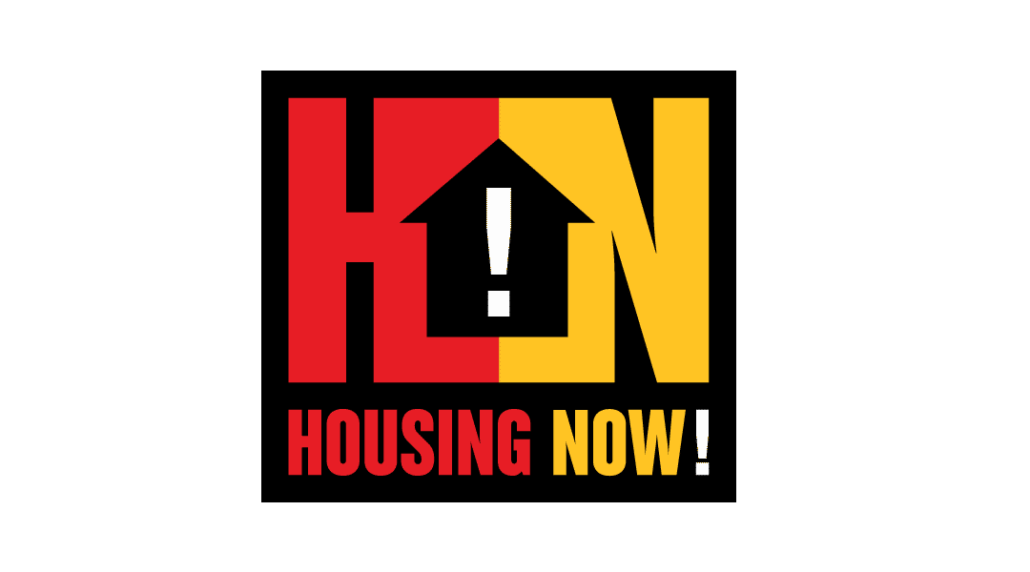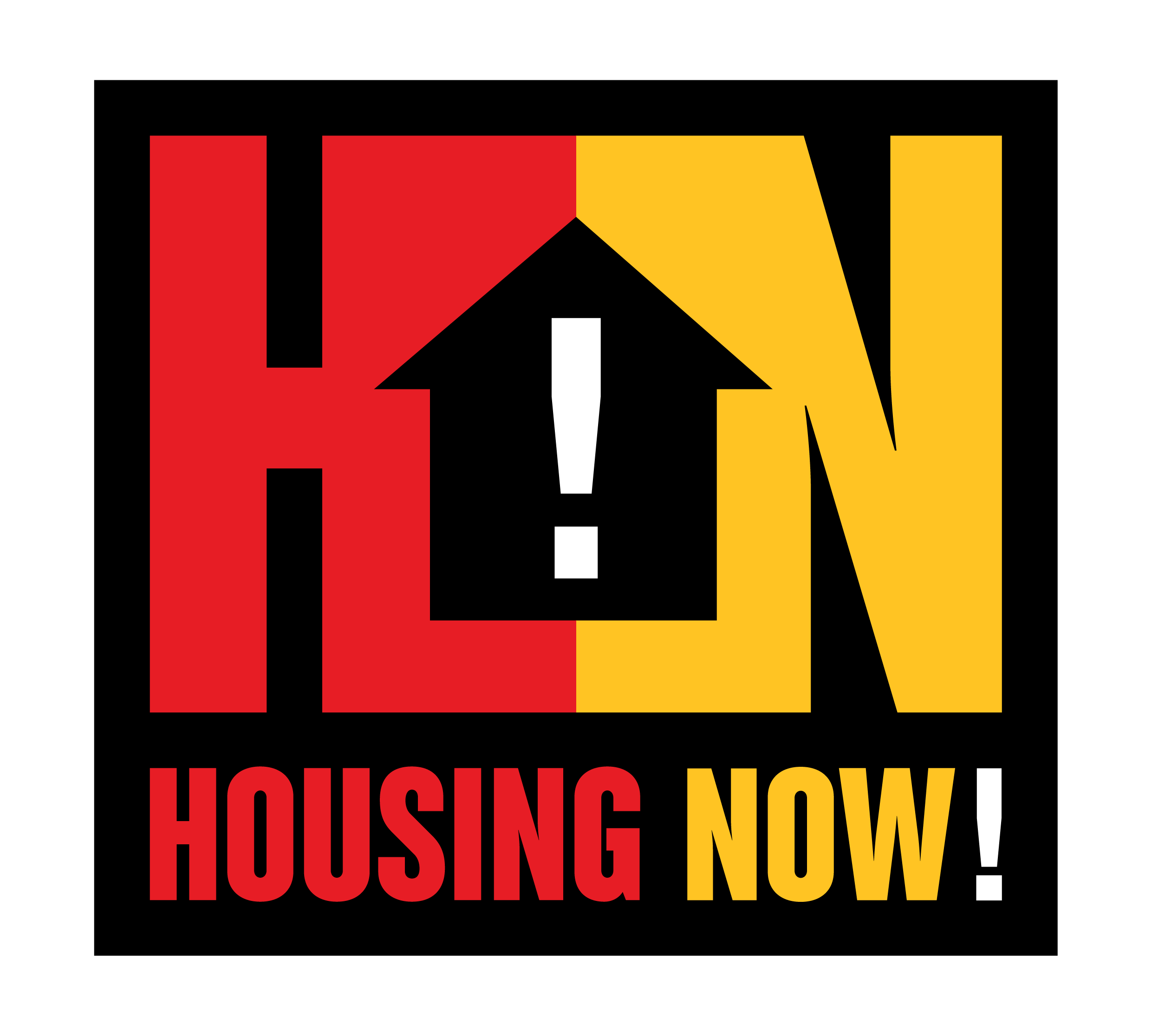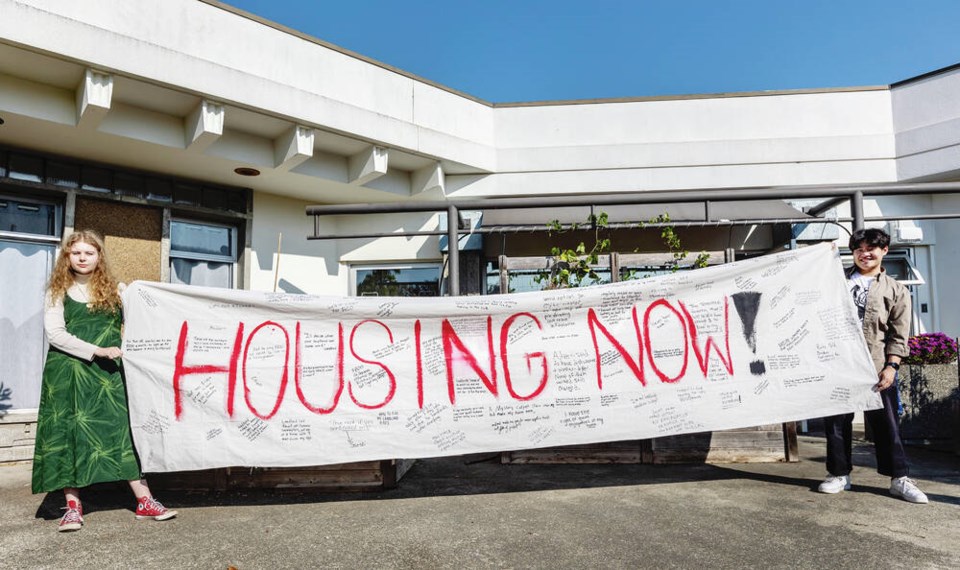Fighting for affordable, safe and secure housing for students, both on and off campus.
Housing Now! promotes accessible and affordable housing for students by lobbying for policies that promote the needs of students, which includes, but is not limited to real and sustained affordability, safety, and security. Your student union focuses on the intersectionality between housing, mental health, food insecurity, and education, to secure a future where students’ can afford to live.
You Deserve Affordable Housing
Pressuring UVic for better On-campus housing
Unlike students who live off-campus, if you live in UVic residences, you are not protected under the BC Residential Tenancy Act. This impacts students’ rights and living conditions significantly. UVic determines its residence fees annually through Policy Guide 6960’s budget process, which sets accommodation fees for both Winter Session and Summer Studies. However, without BC Residential Tenancy Act protections, students face potential challenges such as lease disputes, rent hikes, and maintenance issues. Join us in lobbying UVic administration and provincial policymakers to secure fair treatment, accessible and affordable fee structures, and improved housing conditions for all on-campus students.
Lobbying for Affordable Off-Campus Housing
Our off-campus housing advocacy focuses on ensuring students have access to affordable and quality housing options. We actively lobby for policies that promote affordable off-campus housing, including vacancy control measures to prevent excessive rent increases. Additionally, we support the development of affordable housing projects that cater specifically to student needs. By collaborating with local authorities and developers, we aim to create a stable and inclusive housing environment for all students.
OUR GOALS
1. Create available and affordable housing that falls within the 30% of income ratio for students.
- Lobby B.C. Provincial government to institute vacancy control
- Push UVic to consider a low-cost university housing development
2. Emphasize the intersectionality between mental health, food insecurity, housing, and education.
- Conduct an Affordability survey
- Develop online content based on affordability intersectionality
- Organize a renter’s rights workshop
OUR GOALS
1. Create available and affordable housing that falls within the 30% of income ratio for students.
- Lobby B.C. Provincial government to institute vacancy control
- Push UVic to consider a low-cost university housing development
2. Emphasize the intersectionality between mental health, food insecurity, housing, and education.
- Conduct an Affordability survey
- Develop online content based on affordability intersectionality
- Organize a renter’s rights workshop
Can my Landlord do that?
One of the most powerful tools you can have as a renter is knowing your rights. In B.C. most tenants (or renters) are protected by the same set of laws: the B.C. Residential Tenacy Act. Documents like this one can be hard to understand and not be very approachable especially for first time renters. Below are some common questions renters may have that help guide you through understanding what your rights are as a renter.
Can my landlord ask for a deposit when I sign my rental agreement?
Yes.
At the beginning of your tenancy, the landlord can charge up to a half-month’s rent as a security deposit, which you must pay within 30 days of moving in. Failure to do so can result in a one-month eviction notice.
Your landlord may also require a pet damage deposit of another half-month’s rent, regardless of the number of pets. At the end of your tenancy, the landlord must return the deposits with interest as set by the BC government (typically 0%).
What kind of fees can a landlord charge?
A landlord can charge a non-refundable fee of up to $25 for late payment of rent, only if this term has been written into your tenancy agreement. They can also charge a non-refundable fee for things like additional keys, access devices, and garage door openers, and to replace these things
In all cases, fees can not be more than the actual cost of the items. The Tenant Resource & Advisory Centre has more on fees.
When can my landlord increase rent?
A landlord can increase rent only once every 12 months and only by 3.5% (detirmed by the Residential Tenancy Act). This website is a rent increase calculator to help you ensure your rent was increased by a legal amount.
A landlord must give you three full months’ notice before increasing your rent. Some landlords may try to exclude items like parking or storage from the main agreement so they are not capped by the 3.5% increase limit. To avoid this, ensure all charges are included in your tenancy agreement.
As a renter, can I sublet my unit?
A tenant can sublet their tenancy agreement with the consent of the landlord. The landlord’s consent is always required, but the landlord must not unreasonably withhold consent if you have a fixed-term tenancy with at least six months remaining on it.
The Tenant Resource & Advisory Centre has a template letter to request permission to sublet.
What kind of agreement do I have with my roomates?
Disputes between tenants and roommates aren’t handled by the Residential Tenancy Branch. The Civil Resolution Tribunal (CRT) deals with issues between tenants. Claim amounts are up to $5,000. The Tenant Resource & Advisory Centre has a roomate agreement template meant to help prospective roommates think about what rules they want to agree to before moving into a rental unit together.
Can my landlord enter my rental unit?
Your landlord CAN NOT enter your unit, except for one of the following circumstances:
- they have your permission
- they have a good reason, such as making repairs or showing the unit to potential tenants or purchasers, and they’ve given you between 24 hours and 30 days written notice, stating what date and time they would like to come in
- they want to inspect the rental unit, which they can do this once a month (as long as they give notice as described above)
- they get an order from the Residential Tenancy Branch to enter the rental unit
- there’s an emergency, like a fire or flood
Except in an emergency, a landlord can only enter a unit between 8 am and 9 pm — unless the tenant has agreed to other times.
Neither you nor the landlord may change locks except: in an emergency, if you both agree in writing, or if there is an order from the Residential Tenancy Branch that allows a party to change the locks.
Can I have guests in my rental unit?
A tenant can have guests — and a landlord cannot unreasonably restrict a tenant’s guest from coming onto the rental property. However, if it looks like the guests have moved in, you may be breaking the tenancy agreement. The landlord may try to increase the rent or end the tenancy due to an unreasonable number of occupants.
What do I do if my landlord refuses to make a needed repair?
If a landlord won’t make a necessary repair, you should first talk to them. If there’s still no action, make a written request to the landlord to make the repair (The Tenant Resource & Advisory Centre has a template letter to request repairs). If that doesn’t work, you can apply for dispute resolution. Dispute resolution is done through the Reisdential Tenancy Branch. Helpful tools to help you apply for dispute resolution are found in the resources section of this website page.
You should NOT withhold rent. You should NOT pay for the repairs, hoping the landlord will pay you back — unless the landlord has agreed in writing to do so.
Can my landlord take away my wifi service? What about power or hydro?
A landlord can take away a service that may be included in your tenancy agreement, but they may not take away an essential service. Your landlord must give you 30 days written notice and reduce the rent by the value of the cancelled service. Essential services include heat, electricity, and water.
How do I get my security deposit back?
At the end of a tenancy, there is a framework around the return of security deposits.
First, The condition inspection report
At the end of the tenancy, you and the landlord together must do an inspection of the rental unit. If your landlord doesn’t complete the report, they may lose the right to claim against the security deposit for any damages to the unit or building. If you (the tenant) doesn’t do the inspection, you may lose the right to get your security deposit back. The landlord must complete a condition inspection report.
The landlord must give you a copy of the inspection report within 15 days after you move out or when they get your forwarding address — whichever is later.
Then, the landlord must do one of three things
After you move out the landlord must do one of the following things:
- return the security deposit and any pet damage deposit with interest;
- ask you to agree in writing to any deductions the landlord wants to keep, and then return the rest of the deposits;
- OR file a dispute resolution application asking to keep some or all of the deposits
IF your landlord does none of these things
If the landlord fails to do any of these things, you may be able to get double your deposit back. If you have provided your landlord your written forwarding address within one year of moving out, but the landlord does not return the deposit, you can apply for this remedy.
To seek this compensation you can apply to Residential Tenancy Branch for dispute resolution and an order that the landlord return double the deposit. You have two years — from the last day of your tenancy— to apply for this.
If you don’t give the landlord your forwarding address within one year of moving out, they can keep the security deposit and the pet damage deposit.
Become a Local Housing Advocate!
Community Associations, sometimes called Residents Associations, are non-profit community organizations where residents of neighbourhoods can come together to make change. Renters, and especially students, are often underrepresented in these organizations. Email campaigns@uvss.ca to get involved in your local residents association!
With 13 different municipalities in Greater Victoria, and various neighbourhoods and Community Associations within each one of those, it can be hard to know which neighbourhood you’re in or how to get involved. This map is guide you to figuring out which local Community Association you belong to. Please get in touch if you have any further questions!
Volunteer with Us!
Let’s stand together and fight for a brighter future – because your voice matters.
Your Director of Campaigns and Community relations is looking to train passionate student volunteers on campaign management! You’ll learn how to effectively lobby government, critique policy, and mobilise students around important issues. Join the movement today by signing up here:


